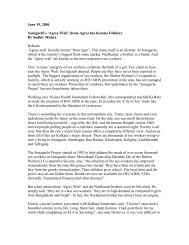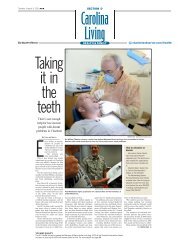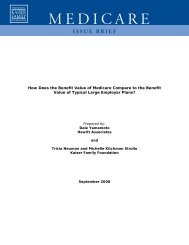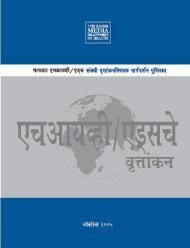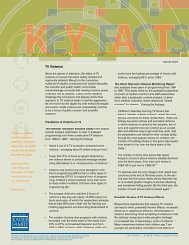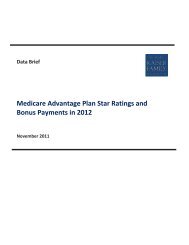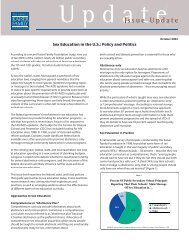HEALTH CARE COSTS: A PRimER - The Henry J. Kaiser Family ...
HEALTH CARE COSTS: A PRimER - The Henry J. Kaiser Family ...
HEALTH CARE COSTS: A PRimER - The Henry J. Kaiser Family ...
You also want an ePaper? Increase the reach of your titles
YUMPU automatically turns print PDFs into web optimized ePapers that Google loves.
Costs, March 2007, http://www.kff.org/insurance/snapshot/chcm030807oth.cfm; Congressional Budget Office, Technological Change and the<br />
Growth of Health Spending, January 2008, http://www.cbo.gov/doc.cfm?index=8947.<br />
26<br />
Bradley C. Strunk, Paul B. Ginsburg, and Michelle I. Banker, “<strong>The</strong> Effect Of Population Aging On Future Hospital Demand,” Health Affairs, vol. 25,<br />
no. 3, 2006, pp. w141-w149; Bradley C Strunk and Paul B. Ginsburg, Aging Plays a Limited Role in Health Care Cost Trends, Center for Studying<br />
Health System Change Data Bulletin No. 23, September 2002., http://www.hschange.com/CONTENT/473/.<br />
27<br />
Kenneth E. Thorpe et al., “Chronic Conditions Account for Rise in Medicare Spending from 1987 to 2006,” Health Affairs, 29, no. 4, April 2010;<br />
Kenneth E. Thorpe et al., “<strong>The</strong> Rising Prevalence Of Treated Disease: Effects On Private Health Insurance Spending,” Health Affairs, Web<br />
Exclusive, June 27, 2005, pp. w5-317 to w5-325; Kenneth E. Thorpe et al., “Trends: <strong>The</strong> Impact of Obesity on Rising Medical Spending,” Health<br />
Affairs, Web Exclusive, October 20, 2004. On trends in mortality rates, see, e.g., David M. Cutler, Edward L. Glaeser, and Allison B. Rosen, “Is the<br />
U.S. Population Behaving Healthier?” National Bureau of Economic Research, NBER Working Paper No. 13013, April 2007,<br />
http://www.nber.org/papers/w13013, and David M. Cutler, Your Money or Your Life: Strong Medicine for America’s Health Care System, (New York:<br />
Oxford University Press, 2004).<br />
28<br />
See, e.g., John F. Cogan, R. Glenn Hubbard, and Daniel Pl. Kessler, Evaluating Effect of Tax Preferences on Health Care Spending and Federal<br />
Revenues, National Bureau of Economic Research, NBER Working Paper No. 12733, December 2006, http://www.nber.org/papers/12733;<br />
Newhouse, 1992; and Burton A. Weisbrod, “<strong>The</strong> Health Care Quadrilemma: An Essay on Technological Change, Insurance, Quality of Care, and<br />
Cost Containment,” Journal of Economic Literature, vol. 29, no. 2, 1991, pp. 523-552.<br />
29<br />
John F. Cogan, R. Glenn Hubbard, and Daniel P. Kessler, “Evaluating Effects of Tax Preferences on Health Care Spending and Federal<br />
Revenues,” National Bureau of Economic Research, NBER Working Paper No. 12733, December 2006, http://www.nber.org/papers/w12733.<br />
30<br />
Donald M. Berwick and Andrew D. Hackbarth, “Eliminating Waste in US Health Care,” JAMA Online, March 14, 2012, pp. E1-E4.<br />
31<br />
Robert Kelley, “Where Can $700 Billion in Waste be Cut Annually from the U.S. Healthcare System?” Thomson Reuters, October 2009<br />
(http://www.factsforhealthcare.com/whitepaper/HealthcareWaste.pdf) and B. Kelley and R. Fabius, “A Path to Eliminating $3.6 Trillion in<br />
Wasteful Healthcare Spending,” Thomson Reuters, 2010,<br />
(http://thomsonreuters.com/content/healthcare/pdf/white_papers/path_eliminating_36_trillion ).<br />
32<br />
Choosing Wisely, ABIM Foundation (American Board of Internal Medicine), April 2012, http://choosingwisely.org/wpcontent/uploads/2012/03/033012_Choosing-Wisely-National-Press-Rls-FINAL.pdf.<br />
33<br />
Ibid, Ginsburg, 2008.<br />
34<br />
Anne B. Martin et al., “Growth in US Health Spending Remained Slow in 2010; Health Share of Gross Domestic Product was<br />
Unchanged from 2009,” Health Affairs, vol. 31, no.1, pp. 208-219, January 2012.<br />
35<br />
Jesse W. Bradford et al., “Accounting for the Cost of U.S. Health Care,” McKinsey Center for U.S. Health System Reform, December<br />
2011, http://healthreform.mckinsey.com/.<br />
36<br />
See various cost control options at John Holahan et al., “Containing the Growth of Spending in the U.S. Health System,” Urban<br />
Institute, October 2011, http://www.urban.org/uploadedpdf/412419-Containing-the-Growth-of-Spending-in-the-US-Health-System.pdf and<br />
<strong>The</strong>odore Marmor, Jonathan Oberlander, Joseph White, “<strong>The</strong> Obama Administration’s Options for Health Care Cost Control: Hope<br />
Versus Reality,” Annals of Internal Medicine, April 2009, Vol. 150, No.7.<br />
37<br />
Congressional Research Service, Comparative Clinical Effectiveness and Cost-Effectiveness Research: Background, History, and Overview,<br />
October 15, 2007; Congressional Budget Office, Research on the Comparative Effectiveness of Medical Treatments: Issues and Options for an<br />
Expanded Federal Role, December 2007, http://www.cbo.gov/doc.cfm?index=8891; Marcial Velasco Garrido et al., Health Technology Assessment<br />
and Health Policy-making in Europe, European Observatory on Health Systems and Policies, 2008, http://www.euro.who.int/Document/E91922.pdf.<br />
38<br />
Peter R. Orszag, 2008.<br />
39 NICE argued that, based on models of beta interferon’s potential long-term benefits, about which evidence was not widely available, the high cost<br />
of the treatment did not justify its inclusion into the national benefits formula.<br />
40<br />
Centers for Medicare and Medicaid Services, Memo from Chief Actuary Richard S. Foster, “Estimated Financial Effects of the “Patient<br />
Protection and Affordable Care Act,” as amended,” April 22, 2010, https://www.cms.gov/Research-Statistics-Data-and-<br />
Systems/Research/ActuarialStudies/downloads//PPACA_2010-04-22.pdf.<br />
41<br />
See, e.g., Peter R. Orszag and Ezekiel J. Emanuel, “Health Care Reform and Cost Control,” <strong>The</strong> New England Journal of Medicine,<br />
August 12, 2010, pp. 601-603; David Cutler, “How Health Care Reform Must Bend <strong>The</strong> Cost Curve, “ Health Affairs, June 2010, pp. 1131-<br />
1135; Peter R. Orszag, “Following Doctor’s Orders,” Office of Management and Budget Blog Post, April 1, 2010,<br />
http://www.whitehouse.gov/omb/blog/10/04/01/Following-DoctorOrders; Office of the Actuary, Centers for Medicare & Medicaid Services,<br />
letter from Richard S. Foster, “Estimated Financial Effects of the “Patient Protection and Affordable Care Act,” as Amended”, April 22,<br />
2010, https://www.cms.gov/ActuarialStudies/Downloads/PPACA_2010-04-22.pdf.<br />
42<br />
Anne B. Martin et al., Health Affairs, January 2012, p. 211.<br />
43<br />
In addition to uncertainty about economic projections, CBO states that the ACA “made broad changes to the nation’s health care and<br />
health insurance systems. <strong>The</strong>re are great uncertainties surrounding the potential budgetary impacts of those changes because they<br />
require assumptions about an array of technical, behavioral, and economic factors.” See pp. 20-21 of <strong>The</strong> Budget and Economic<br />
Outlook: Fiscal Years 2011 to 2021, http://www.cbo.gov/ftpdocs/120xx/doc12039/01-26_FY2011Outlook.pdf.<br />
44<br />
For criticism of the tax treatment of employer-provided insurance, see John F. Cogan, R. Glenn Hubbard, Daniel P Kessler, Healthy,<br />
Wealthy, and Wise, <strong>The</strong> Hoover Institution Press. 2011, http://www.scribd.com/doc/48910486/Healthy-Wealthy-and-Wise-2nd-Edition-by-<br />
Cogan-Hubbard-Kessler and http://www.hoover.org/publications/defining-ideas/article/76796.<br />
45<br />
“Obesity Accounts for 21 Percent of U.S. Health Care Costs,” Newswise, April 9, 2012, http://www.newswise.com/articles/obesityaccounts-for-21-percent-of-u-s-health-care-costs.<br />
46<br />
Kenneth E. Thorpe, Lydia L. Ogden, and Katya Galactionova, “Chronic Conditions Account for Rise in Medicare Spending from 1986<br />
to 2006,” Health Affairs, 29, no. 4, published online February 18, 2010, pp. 718-724.<br />
34 THE HENRY J. KAISER FAMILY FOUNDATION




